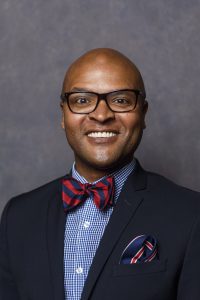
When Dr. Steve D. Mobley Jr. was a child, he learned about college life through film and television.
The characters on the hit show “A Different World” fascinated him. From Whitley Gilbert, a student from an affluent family, to Dwayne Wayne, a hip, yet nerdy, math major, the characters portrayed at fictional Hillman College sealed his decision to pursue an undergraduate degree at Howard University, one of the country’s prominent Historically Black College and Universities.
But it was one character – or lack thereof – on the show that later inspired his dissertation. The juxtaposition of Lena James, a low-income student who was introduced in Season 5, and Gilbert, prompted exploration of the intra-racial differences between black students on HBCU campuses and how they encounter social class.
“With regard to the nuance, I won’t say that I started to become critical of ‘A Different World’ or those characters,” Mobley said, “but I’m critical in this way: it’s very telling that a low-income character did not appear on ‘A Different World’ until Season 5. I love the show, but I didn’t see someone I was able to identify with until the show was almost over.”
Mobley, a University of Alabama assistant professor of higher education, gained the rights to include the characters and narratives of the show to use in his University of Maryland dissertation, “Difference Amongst Your Own: The Lived Experiences of Low-Income African-American Students and Their Encounters With Class Within Elite Historically Black College (HBCU) Environments.”
It was recently selected as the 2016 Dissertation of Year by the Southern Association for College Student Affairs.
Mobley’s study also won the American Association of Blacks in Higher Education’s Dissertation of the Year Award and the 2016 Outstanding Dissertation Award from the National Association of Diversity Officers in Higher Education.
The study explored the experiences of low-income African American students at elite HBCUs Howard and Hampton University and found that students struggled to adjust to campus culture and felt isolated because of the complex division of social classes.
Students often engaged in “class passing,” a term Mobley used to describe the coping mechanism of students adopting speech patterns and dress of affluent black students while being less-likely to reveal details of their upbringing.
Mobley also found that alumni who had low-income roots and then achieved greater education and social capital often struggled to relate to family members and friends in their respective hometowns.
The transformations that low-income black students experience at elite HBCUs are unique and rarely discussed, Mobley said.
“Unlike racial passing, when it’s all or nothing, some of these students ‘passed’ full-time and some part-time, and were selective in how they divulged specific aspects of their lives to their more affluent and middle class classmates,” Mobley said.
“Social class is an issue that’s often taboo in black communities and difficult to talk about or address. A scholar once said in a book called ‘Limbo’ that, ‘we talk grandly of class metamorphosis like it’s a great thing, but as soon as you give someone access, it’s also a bridge burning.’
“They’re forever changed, and how does that affect relationships with their families? It’s a life in between two worlds.”
Mobley said previous studies of black students’ experiences in higher education have focused on students from varying socioeconomic statuses and their experiences at predominately white universities, as well as comparative studies about how lower-income white students experience those environments.
“There have also been a lot of comparative studies on black HBCU students versus black students at white schools,” Mobley said, “but [HBCUs] are so unique, and it’s time to focus within. Within the media and within broader societal discourses, HBCUs are painted with a broad brushstroke.
“But they’re not all the same, and they are not all in peril. There are elite HBCUs out there that are very competitive. I also wanted to drive the point home that African-Americans in higher education are complex and nuanced.”
Mobley interviewed 10 students of lower-income backgrounds from both universities, carefully selecting students from different geographic regions to reflect diversity in their environments.
Mobley conducted two sets of interviews with each person, held focus groups and assigned each a reflection activity in which the participants each wrote a letter of the things they’d want to tell themselves on their first day of college.
Mobley’s hopes his novel methodology — hermeneutic phenomenology – will have implications for future education research. The methodology has a strong philosophical underpinning and relies on a deep and iterative process to uncover information, Mobley said.
“The strength of the methodology is that it’s a raw, yet sensitive approach that breathes life into the phenomena that you want to study,” Mobley said.
“And it also allows the researcher to become dangerously close to the phenomenon because they’ve also lived it. Some look at it as a philosophy; others look at it as a methodology. I think of it as both.”
Contact
David Miller, UA media relations, 205/348-0825, david.c.miller@ua.edu
Source
Dr. Steven D. Mobley Jr., 205/348-0542, sdmobley@ua.edu
